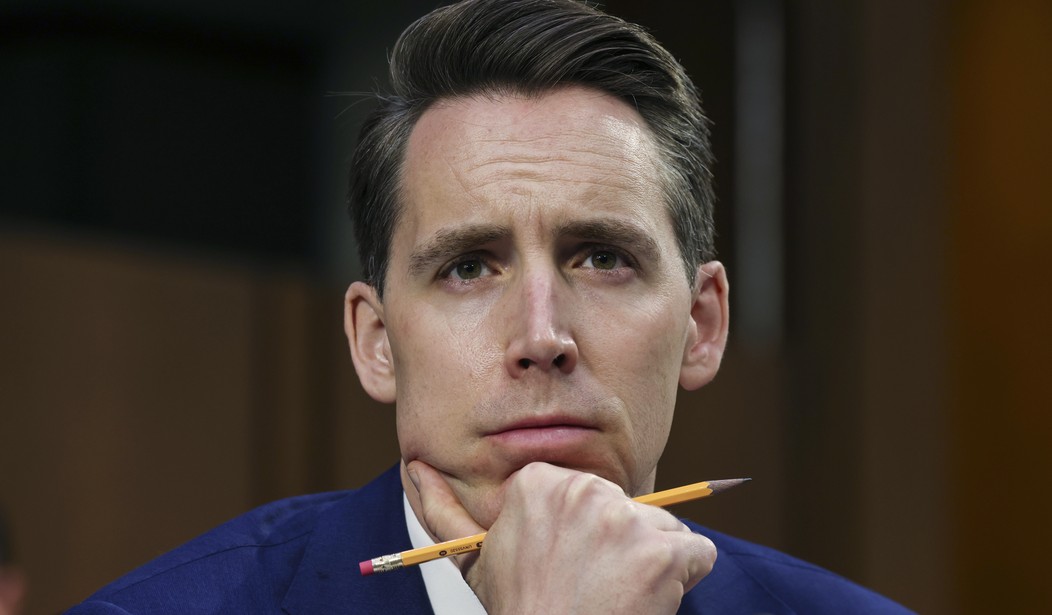Time to quit while we’re behind? This kind of realpolitik might seem surprising from one of the non-moderates in the GOP Senate caucus, but perhaps not from a MAGA stalwart like Josh Hawley (R-MO). And it has the added virtue of not just being realpolitik but also blindingly obvious:
Sen. Josh Hawley (R-Mo.) is calling on the Biden administration to drop longstanding U.S. support for Ukraine’s eventual membership in NATO, arguing that a binding commitment to defend the country would undermine efforts to counter China.
Why it matters: Hawley is staking out a position increasingly supported by the Republican base but historically at odds with the mainstream GOP consensus still backed by his Senate colleagues.
Context: Former President George W. Bush and all NATO leaders agreed at the 2008 Bucharest Summit that Ukraine and Georgia “will become” members of the alliance — though no specific roadmap was offered at the time.
This was one of a series of missteps in eastern Europe and the Caucasus in the post-Soviet period. The 1994 Budapest Agreement started off a cascade of entanglement in Ukraine by offering security promises (although not specific guarantees) in exchange for Ukraine’s denuclearization. Russia co-signed that agreement, but it was Boris Yeltsin’s Russia, and a very financially broken Russia at that. Yeltsin wanted the nukes contained too, and likely didn’t see any potential for threatening Ukrainian sovereignty in the future.
That changed by the end of the decade, once Russia got its financial house more in order. The centuries-old desire for empire returned, and Vladimir Putin rode that into office. By the time of the Bucharest Summit, NATO and the US should have known better than to keep antagonizing Moscow over NATO expansion. The declaration in May 2008, with George Bush’s apparent blessing, doesn’t just offer support for self-determination and the freedom of sovereign nations to choose their own alliances. It explicitly declared that NATO intended to expand all the way around Russia’s western border, save Belarus:
23. NATO welcomes Ukraine’s and Georgia’s Euro-Atlantic aspirations for membership in NATO. We agreed today that these countries will become members of NATO. Both nations have made valuable contributions to Alliance operations. We welcome the democratic reforms in Ukraine and Georgia and look forward to free and fair parliamentary elections in Georgia in May. MAP is the next step for Ukraine and Georgia on their direct way to membership. Today we make clear that we support these countries’ applications for MAP. Therefore we will now begin a period of intensive engagement with both at a high political level to address the questions still outstanding pertaining to their MAP applications. We have asked Foreign Ministers to make a first assessment of progress at their December 2008 meeting. Foreign Ministers have the authority to decide on the MAP applications of Ukraine and Georgia.
Three months later, Putin invaded Georgia — a move that appeared to lead Barack Obama to choose Joe Biden as his running mate for his supposed foreign-policy expertise. Putin carved out Abkhazia and South Ossetia from Georgia and recognized their “independence,” but in reality set them up as vassal states to serve as a buffer to potential NATO troops.
What did we learn from that? Not much. When Obama and Biden threw in with the anti-Russian political forces in Ukraine a few years later, Putin executed the same plan in Ukraine. He seized Crimea outright and set up Russian-separatist militias to run the ethnically Russian Donbas.
Would Putin retreat from the rest of the Ukraine border if NATO rescinded the Bucharest Declaration? Maybe, and that would certainly be a point of negotiation. Instead, NATO seems intent on defending it on the principle of self-determination, which is a fine principle — but hardly practical in this instance, since it seems to be the catalyst for the end of Ukrainian sovereignty altogether. Biden’s sending troops to eastern Europe to prop up this position, but we couldn’t possibly defend Ukraine at this point in an invasion, especially not without committing all of our resources to that front.
That would lead to an all-out war with Russia that would necessarily eat up resources we’re using to check China, as Hawley argues. The China issue seems like a secondary point at best to the fact that war with Russia would be extremely bad, but it’s still a valid strategic point. Hawley might be raising it to allow Biden a face-saving way to do what we should have done in 2008 and again in 2014 by dumping that part of the Bucharest Declaration. Yes, it would make the West look foolish, in large part because we were foolish, if well-intended. But we all know where the road paved with good intentions leads, too.
If you haven’t caught it yet, be sure to listen to my podcast from yesterday with King Banaian on Ukraine. It also has more background on the generation of foolish thinking that led us to this impasse.








Join the conversation as a VIP Member